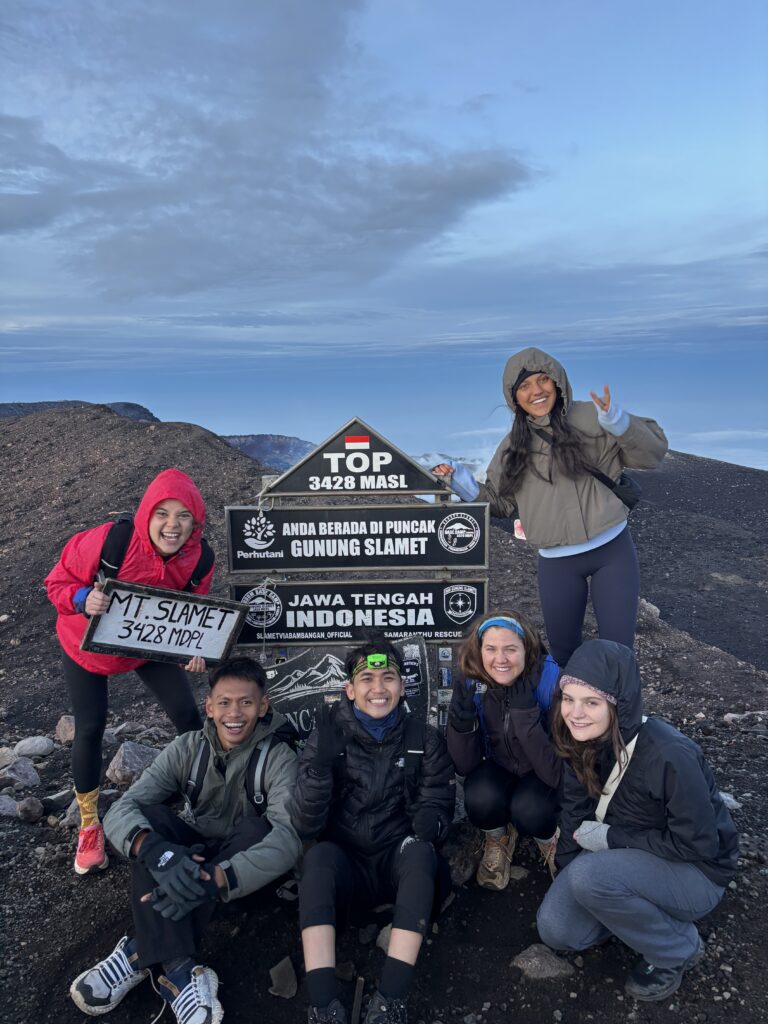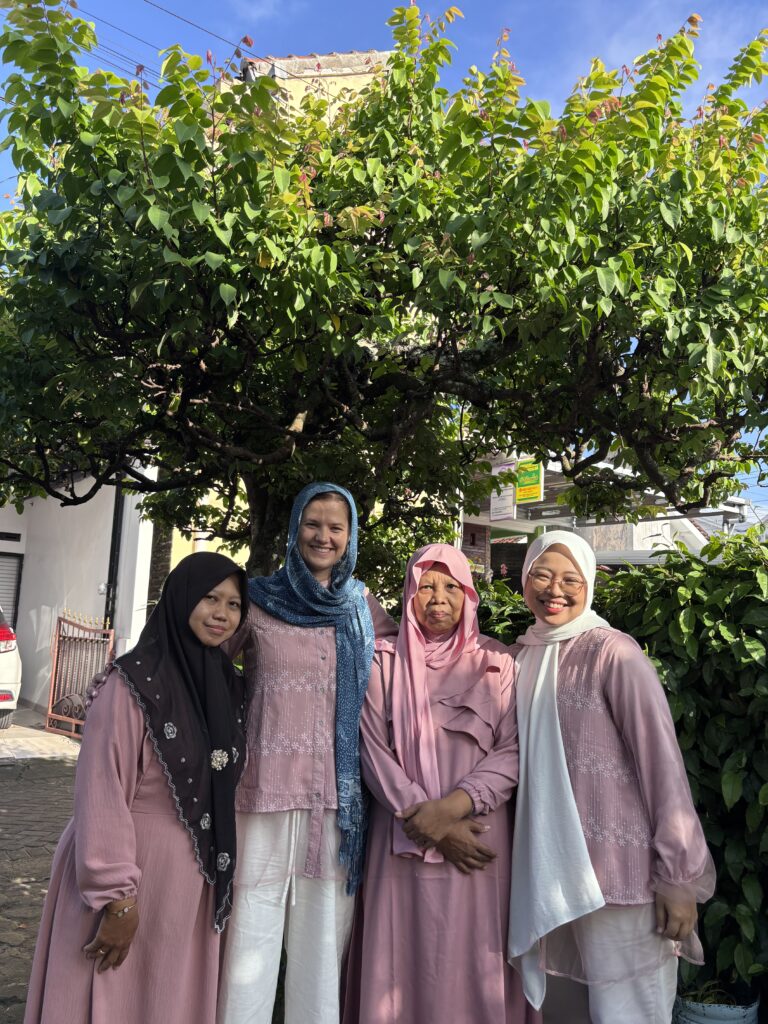Hannah Thornton is a New Colombo Plan Mobility Grant recipient from Murdoch University. Hannah undertook the Flexible Language Immersion Program (FLIP) in 2025.
Q: Why did you decide to undertake the Acicis program?
I have always wanted to learn another language, and it made geographic and geopolitical sense to learn Bahasa Indonesian. However, after six months of learning online, I realised I needed to be immersed in the language and culture to become conversational, and the FLIP program provided that opportunity.
Q: Did you receive a New Colombo Plan Mobility Grant? If so, how did this contribute to your experience in Indonesia?
I received the New Colombo Plan Mobility Grant for the Salatiga Short Course in January 2023 and for FLIP SEM59 2024. The grant was a significant factor in my decision to join the Acicis programs, as the prospect of taking time off work and out of my career felt irresponsible without the grant’s support.
Q: What classes/units are you currently enrolled in?
I am enrolled in four courses through FIB (INCULS): Lanjut 1 Menyimak, Tata Bahasa, Menulis and Terjamahan. One of the great things about these classes is the diversity of countries represented, which always makes class discussions more interesting. I take Introduction to International Law in Fakultas Hukum in the IUP program (so it’s taught in English). This class has been such an eye-opening exposure to international law as viewed through the lens of a country not based on Western legal tradition. I take two courses in the FISIPOL IUP program – Indonesian-Australian Relations and Indonesian Social and Political System. These classes have been great for gaining an Indonesian perspective on Australian politics and understanding the Indonesian political system. The experiences and perspectives of Indonesian students in these classes were invaluable to current understanding political events.
Q: Are you involved in any clubs/societies at the university?
Yes! I highly recommend that students attend the Gelex show in August to see all the club offerings at UGM. I joined the UGM Athletics Club and trained 3 times a week at Pancasila Stadium UGM. It’s been a great way to make friends, stay fit and practice Bahasa. There are coaches to keep the training sessions structured and to keep everyone motivated. However, it’s also casual and open to all skill levels. The stadium is a hub of activity in the evenings, with soccer, track, marching band, and archery all happening simultaneously. I joined the UGM Perisai Diri club (pencak silat) to experience an Indonesian martial art. We train two times a week at GOR UGM. This community has been incredibly welcoming, and learning a language through movement has been a great way to accelerate vocabulary acquisition. A highlight was the road trip we took together to Bantul for our grading. I joined the FIB team for Porsenigama (the annual interfaculty competition in August/September). This competition was incredible; the level of student participation across sports and arts was truly impressive, and Indonesians really are the best team supporters.
Q: How will your proficiency in Indonesian Language gained through the Flexible Language Immersion Program influence your future career or study?
I have absolutely loved my time in Yogya (so much so that I extended for an extra semester). My time on FLIP has changed my career trajectory. I’m not planning on returning to my profession in urban and regional planning but instead exploring options to work in the international development space, possibly in Indonesia.

Q: How different is in-country Indonesian language learning to your previous experiences in an Australian classroom environment?
It’s incomparable. The experience on FLIP has been so immersive, and I’ve learnt so much more about Indonesian people and culture than is possible in a classroom situation. I have made so many friends in Indonesia that I’m sure I will retain for life. I have accelerated my understanding of Bahasa through lived experience. For example, after climbing a volcano in Java, you will never forget the words “monggo”, “hati-hati”, “licin” and “awas”. Similarly, participating in sporting clubs, taking trips to friends’ hometowns, and completing group assignments with Indonesian students help develop context-specific vocabulary. It’s one thing to learn a language in a classroom, but it’s another level to live it and understand the idiosyncrasies of how it is spoken on the street.
Q: What do you like to do in your spare time in Yogyakarta?
I love running, and luckily, running clubs and events are very trendy in Indonesia right now. I have joined many running communities and made many friends. You can often get free coffee and photos through these communities. I also love climbing mountains and have had the opportunity to climb Merbabu, Slamet, Sumbing and Lawu.
Q: What challenges did you face during your program and how did you overcome it?
It took me a while to relax into the ‘santai’ pace of Yogyakarta, including embracing the concept of ‘jam karet’ and learning not to schedule too much into a day. Most of my best experiences came from hanging back after sports or class to spend time together. My big takeaway from the exchange is if you try to maintain the Australian pace of life, you will miss many opportunities to form deeper connections with the other students.
Q: Favourite Indonesian word/phrase? Why?
Nggak apa-apa – It’s an easy way to sound more local.
Q: What’s the most interesting new discovery or story during your stay in Indonesia?
During my stay in Indonesia, one of the most unforgettable experiences was being welcomed into my friend Estu’s family for Hari Raya, the festive celebration marking the end of Ramadan. It was a true immersion into Javanese culture and community life. The preparations began with making ketupat. Estu’s family taught me very patiently how to weave the coconut leaves into intricate diamond-shaped containers. On the night of Hari Raya, the entire neighbourhood came alive for the RT parade around the mosque. Each RT (neighbourhood association) vied for the title of best costumes and most dazzling parade, and the atmosphere was incredible.
The next day, we joined the “Mudik” migration, travelling to Estu’s grandmother’s house in the village. For a week, we lived under one roof—three generations sharing the daily routines of rural life. We made the Indonesian snack, bakso, to sell at the beach and ate local produce including fish bought straight from the fishermen as they pulled their boats onto the sand. This experience allowed me to appreciate the simplicity and richness of Javanese culture. The language, the customs, and the daily rhythms of life were so wholesome. I learned to speak a few phrases in Javanese, which the locals appreciated immensely.

Q: Will you recommend Acicis to other students?
Absolutely. I think given the assistance available through the NCP grant and OHS Help, any student studying Indonesian at uni is crazy not to study abroad. Acicis not only makes the application process super easy, but also creates an invaluable Australian and Indonesian support group in-country.
Q: Favorite Indonesian food / favorite place to eat?
No question, the nasi rames from the FIB Kantin!



